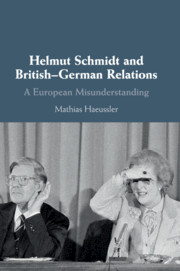Book contents
- Helmut Schmidt and British–German Relations
- Helmut Schmidt and British–German Relations
- Copyright page
- Contents
- Illustrations
- Acknowledgements
- Abbreviations
- Introduction
- 1 The Young Helmut Schmidt and British–German Relations, 1945–1974
- 2 Harold Wilson, 1974–1976
- 3 James Callaghan, 1976–1979
- 4 Margaret Thatcher, 1979–1982
- Conclusions
- Bibliography
- Index
Conclusions
Published online by Cambridge University Press: 18 March 2019
- Helmut Schmidt and British–German Relations
- Helmut Schmidt and British–German Relations
- Copyright page
- Contents
- Illustrations
- Acknowledgements
- Abbreviations
- Introduction
- 1 The Young Helmut Schmidt and British–German Relations, 1945–1974
- 2 Harold Wilson, 1974–1976
- 3 James Callaghan, 1976–1979
- 4 Margaret Thatcher, 1979–1982
- Conclusions
- Bibliography
- Index
Summary
When Britain voted to leave the EU on 23 June 2016, some German commentators were quick to depict the referendum outcome as merely one further episode of Britain’s allegedly historic scepticism or hostility towards European integration since 1945. Already a few days prior to the vote, the weekly Der Spiegel had claimed that ‘nothing’ had changed in Britain’s EU policies since the days of Margaret Thatcher. ‘London has never viewed European integration as a project of overriding significance’, it yelled; ‘Britain has always tried to derive the maximum benefit for itself. The British weren’t interested in any European added value.’1 Once the British people had cast their vote, Zeit editor Josef Joffe offered even more hyperbole in a hastily arranged symposium by the online magazine Politico. ‘The nation that masterminded Europe’s fate for 400 years will slink off into an offshore Austria, a remnant of the once-mighty Habsburg Empire’, he claimed; ‘not since the Germans voted Hitler into power has a democratic electorate inflicted so much harm on its glorious history and its prospects … History won’t be kind to the 52 percent who bolted from greatness.
- Type
- Chapter
- Information
- Helmut Schmidt and British-German RelationsA European Misunderstanding, pp. 208 - 221Publisher: Cambridge University PressPrint publication year: 2019



